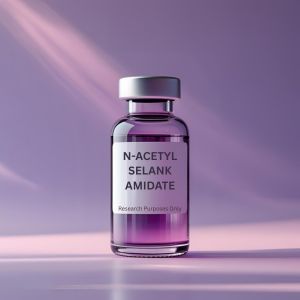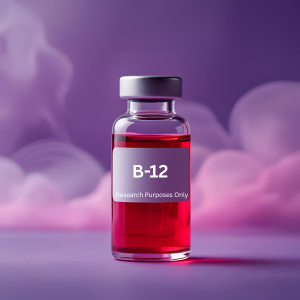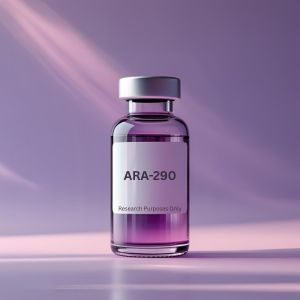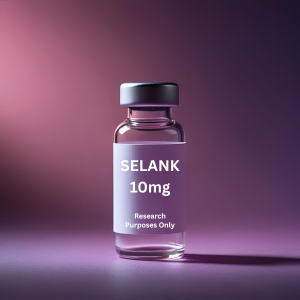Free shipping on orders over $250
N-ACETYL SELANK AMIDATE
$50.00
N-ACETYL SELANK AMIDATE 10mg
N-Acetyl Selank Amidate is a short nootropic and anxiolytic peptide. Research suggests that selank modifies gene expression in the brain, reducing the effects of the neurotransmitter GABA, altering cell membrane permeability and enhancing production of brain-derived neurotrophic factor (BDNF). The modified form of selank, N-Acetyl Selank Amidate has a longer half-life and greater ability to cross the blood-brain brain barrier. It also has tighter receptor binding dur to the amidation. Selank is currently being researched for the treatment of stroke and other ischemic brain diseases. It is also under consideration as a treatment of generalized anxiety disorder and to protect memory in the setting of neurodegenerative disease.
Important Notices:
- This product is sold for scientific research purposes only.
- Product is provided as a lyophilized (freeze-dried) powder in a sealed, sterile vial.
- The quantity on the label refers to the total amount of product inside each vial.
- Additional lab supplies are required for conducting research such as bacteriostatic water for reconstitution, syringes & needles to draw from the vials, and alcohol prep pads for sanitizing vial stoppers prior to needle insertion. These are sold separately.
- Vial appearance, label, seal and cap colors may vary from product photos.
3 in stock
Description
Current research suggests the following potential benefits:
Cognitive and neurological effects
-
- Neuroprotection and nerve regeneration: Semax has been studied for its ability to promote the survival and regeneration of neurons. Studies on N-acetyl semax show it may improve recovery and support motor performance after nerve damage.
- Enhanced brain function: Research suggests that N-acetyl semax may increase levels of brain-derived neurotrophic factor (BDNF). BDNF is crucial for the growth and survival of brain cells, as well as for brain plasticity.
- Improved memory and learning: Studies indicate that Semax and its analogs can improve attention, memory, and concentration.
- Attention-deficit/hyperactivity disorder (ADHD): Research suggests Semax may have potential therapeutic value for ADHD due to its effect on dopamine release and BDNF synthesis.
- Stroke and ischemia: In Russia, Semax is used to treat ischemic stroke and has been shown to protect neurons during hypoxic conditions.
Mood and stress
- Mood enhancement: By modulating serotonin and dopamine systems in the brain, N-acetyl semax may produce mood-enhancing and antidepressant-like effects.
- Stress management: The peptide has been shown to have anxiolytic (anxiety-reducing) properties and can help the brain adapt to chronic stress.
Comparison with Semax
The modifications in N-acetyl semax amidate alter the peptide’s properties compared to the original Semax:
- Increased stability: The N-acetylation modification may prevent the peptide’s degradation and prolong its effects in the body.
- Increased potency: This modification is thought to enhance the compound’s potency.
- Altered properties: N-terminal acetylation can modify the peptide’s ability to interact with ions, such as copper (Cu(II)), which may affect its cellular protection mechanisms




